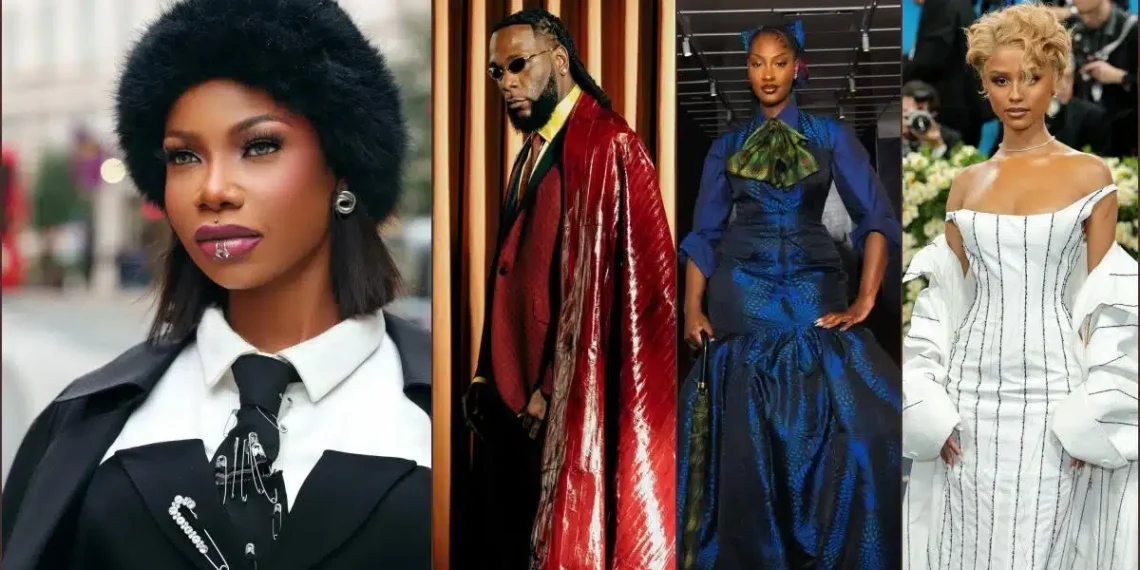Tacha Akide, the outspoken reality TV star and media personality, has once again stirred social media controversy with her candid review of Nigerian celebrities’ outfits at the 2025 Met Gala. Known for her unfiltered honesty, Tacha didn’t hold back as she called out Burna Boy, Tems, Ayra Starr, and others for their “underwhelming” fashion choices at one of the world’s most prestigious style events. Her comments have sparked heated debates among fans and critics alike, emphasizing the importance of style, representation, and cultural pride on the global stage.
Tacha Critiques Nigerian Celebrities’ Met Gala Looks With No Holds Barred
In a viral video shared on her platform, Tacha begins by clarifying that her critique comes from a place of love. She openly states, “So the Nigerians at the Met Gala did not represent, and this is coming from a place of love. You know I love Ayra Starr and Tems, and I’m crazy about Burna Boy, but trust me, they didn’t represent at all. Just had to say it!”
Her bluntness immediately caught attention, as she dissected each celebrity’s look with sharp wit and honest opinions. Tacha first targeted Tems, saying she couldn’t understand the concept behind her outfit. “Girl, I get that the outfit was Oswald Boteng, but it’s very clear you weren’t their first choice because I’m not even understanding this outfit at all. Haven’t you heard of Veekee James or Swanky Jerry? They would have brought the moon down for your outfit with pure creativity,” she added, emphasizing her disappointment with Tems’ appearance.
Moving on to Ayra Starr, Tacha expressed her dissatisfaction, stating that the young star did not meet expectations. “You’re our future of Afrobeats, our Gen Z baddie. You cannot be wearing that to the Met Gala. It’s giving last-minute or like you weren’t even informed. The look is giving Mary Amaka. Please don’t do it again,” she urged, highlighting the importance of style evolution among Nigeria’s rising stars.
Even Burna Boy, celebrated globally for his bold fashion sense, was not spared from Tacha’s critique. “Burna Boy, you always kill the red carpet—what happened? You never miss, but this time, you did. We love you, but next time, let’s come correct,” she said, urging him to step up his fashion game for future appearances.
Tacha’s Bold Take on Nigerian Representation at the Met Gala
Tacha’s comments extend beyond mere fashion critique; she touches on the broader issue of Nigeria’s representation on the international fashion stage. She concluded by making a striking comparison, saying, “Let’s not even lie, even Priscilla’s wedding served us better looks. One thing Nigerians are known for is music and also fashion sense. I love my people, but someone had to say it.”
Her remarks have sparked mixed reactions, with some fans praising her honesty and others criticizing her for being too harsh. Nevertheless, her critique raises a vital conversation about how Nigerian celebrities portray their culture and style on global platforms. It also emphasizes the need for more creativity and authentic representation in fashion choices during such significant events.
The Importance of Cultural Pride and Style in Global Events
Tacha’s critique sheds light on a growing concern among fans and fashion enthusiasts: whether Nigerian celebrities are doing enough to showcase their cultural identity through fashion at international events like the Met Gala. With Nigeria’s rich cultural heritage and vibrant fashion scene, there’s an expectation for stars to elevate their style game and present a more authentic, creative image that celebrates their roots.
Fashion, after all, is a powerful tool for storytelling and cultural diplomacy. When celebrities opt for unique, culturally inspired outfits, they not only command attention but also promote Nigerian culture globally. Tacha’s comments serve as a call to action for celebrities to embrace their heritage while aligning with global fashion standards.
The Impact of Celebrity Fashion on Nigeria’s Global Image
As Nigeria continues to make waves in music, film, and art, the country’s fashion industry is also gaining international recognition. However, the way celebrities dress on global platforms directly influences Nigeria’s image abroad. Therefore, making bold, creative, and culturally resonant fashion statements at events like the Met Gala is more than just personal style—it’s a reflection of national pride.
Tacha’s critique reminds us that Nigerian celebrities have a responsibility to represent their culture well, especially when the eyes of the world are watching. With more innovation and authenticity, Nigeria’s fashion scene can continue to grow and leave a lasting impression on the global stage.
What’s Next? Elevating Nigerian Fashion on the World Stage
Moving forward, the focus should be on nurturing Nigerian designers and encouraging celebrities to collaborate with creative minds who can craft standout looks that fuse tradition with modernity. This approach not only elevates the individual’s style but also promotes Nigeria’s rich textile and design heritage globally.
Tacha’s comments, although controversial, have ignited an essential conversation about representation, creativity, and authenticity. If Nigerian celebrities embrace this challenge, Nigeria’s fashion industry could become a powerhouse that consistently impresses at international events, showcasing its unique beauty and cultural depth.



